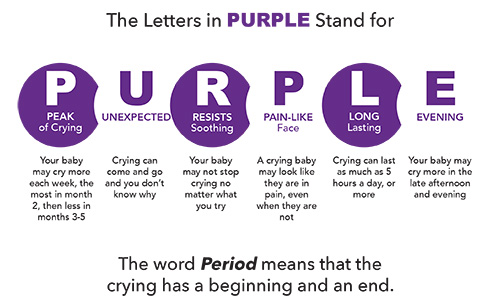
As a new parent, it's natural to feel excitement, joy and perhaps a touch of anxiety. One common challenge parents face is decoding their baby's cries. Understanding what is normal and what might require attention can help you navigate the early days of parenthood with confidence.
Sometimes, the source of a baby’s crying can be figured out: the baby is hungry, wet or tired. But other times, it’s less obvious why babies cry. There might be a certain time of day they cry the most, and it might be difficult — or impossible — to soothe them. The good news is this is a normal phenomenon that research has discovered in babies worldwide.
Crying is normal
It can be heart-wrenching for parents when their babies cry relentlessly. But knowing that all babies go through this stage can ease parents’ minds. Generally, babies follow this timeline:
- Babies often will start to cry more at about 2 weeks old, peak around 2 months, then get better by 3, 4 or 5 months.
- Babies who are happy and smiley during the day may enter their crying phase later in the day or at night.
- Many babies cry more in the late afternoon or evening, and some may cry for up to five hours a day.
- Some babies cry more, some less — but almost all babies go through this stage.
What to do
There are a number of steps to take to troubleshoot newborn crying.
First, it’s important to rule out common reasons a baby is crying.
- Is your baby hungry, wet/dirty or tired?
- Does your baby want to be held or are they overstimulated?
- Is your baby ill? If your baby has a fever, take action by calling your pediatrician.
Then, try these soothing techniques:
- Carry, hold or “wear” your baby in a carrier.
- Connect with your baby. Give them a kiss, hold then tight and give them eye contact.
- Give your baby a bath.
- Take your baby for a walk in a stroller or a ride in the car. A change of scenery can often help.
- Try giving the baby a pacifier. Sucking can be soothing.
- Use soothing music or sing a lullaby to your baby. Some babies like white noise. You can play white noise through an at-home device, an app or even by turning on a vacuum cleaner or fan
Managing your stress
A baby’s crying can make parents feel helpless, frustrated or even angry. When you are feeling this way and feel you can’t tolerate the crying anymore, take the following steps:
- See if someone else can care for your baby for a short period of time until you can compose yourself. If you don’t have another caregiver, put your baby in a safe place, like a crib. Close the door and take a break in a quieter area. During this time, temporarily divert your attention to:
- Listening to music
- Playing with a beloved pet
- Meditating or breath work
- Do not pick up or hold your baby if you feel angry. Take a few deep breaths, drink water or tea, or call a friend or family member for support.
- Never shake your baby. Shaking can cause severe problems, including brain damage, seizures or even death. Letting your baby cry is much safer for them.
Remember: As a parent at any stage, it’s important to prioritize self-care so you can take better care of others. Rest, proper nutrition and even exercise could put you in a better headspace to cope with trying parental situations.
Period of PURPLE Crying
 As part of our mission to empower Wisconsin’s kids and their families to be the healthiest they can be, we share the program Period of PURPLE Crying with parents and through our community work with the goal of preventing abusive head trauma or Shaken Baby Syndrome.
As part of our mission to empower Wisconsin’s kids and their families to be the healthiest they can be, we share the program Period of PURPLE Crying with parents and through our community work with the goal of preventing abusive head trauma or Shaken Baby Syndrome.
This informative parental resource explains the characteristics of developmental crying and gives additional tips and ideas. It has helped many parents understand that although their baby may cry a lot during a certain time, there is nothing wrong with their baby or with them as parents.
More than three hours of crying a day may be a cause for concern, especially if this is different or unusual for your child. In addition, if you are concerned about your baby’s crying, or if crying is accompanied by other symptoms, call your pediatrician.
Your pediatrician can serve as a champion for you and your family. For this reason, it’s important to share if and when things change. Please voice your concerns to our team.
Children's Wisconsin Resources

Written by
Heather Underkofler
, MD
Pediatrician
Related Stories
No related articles found.



